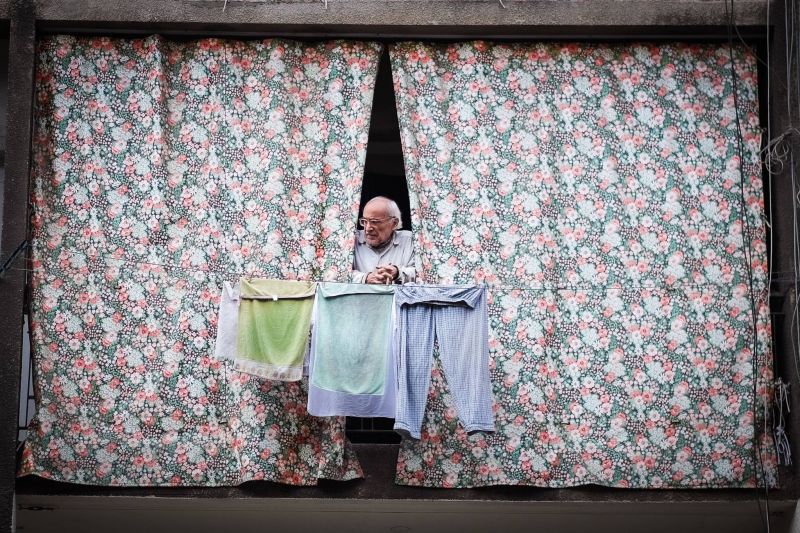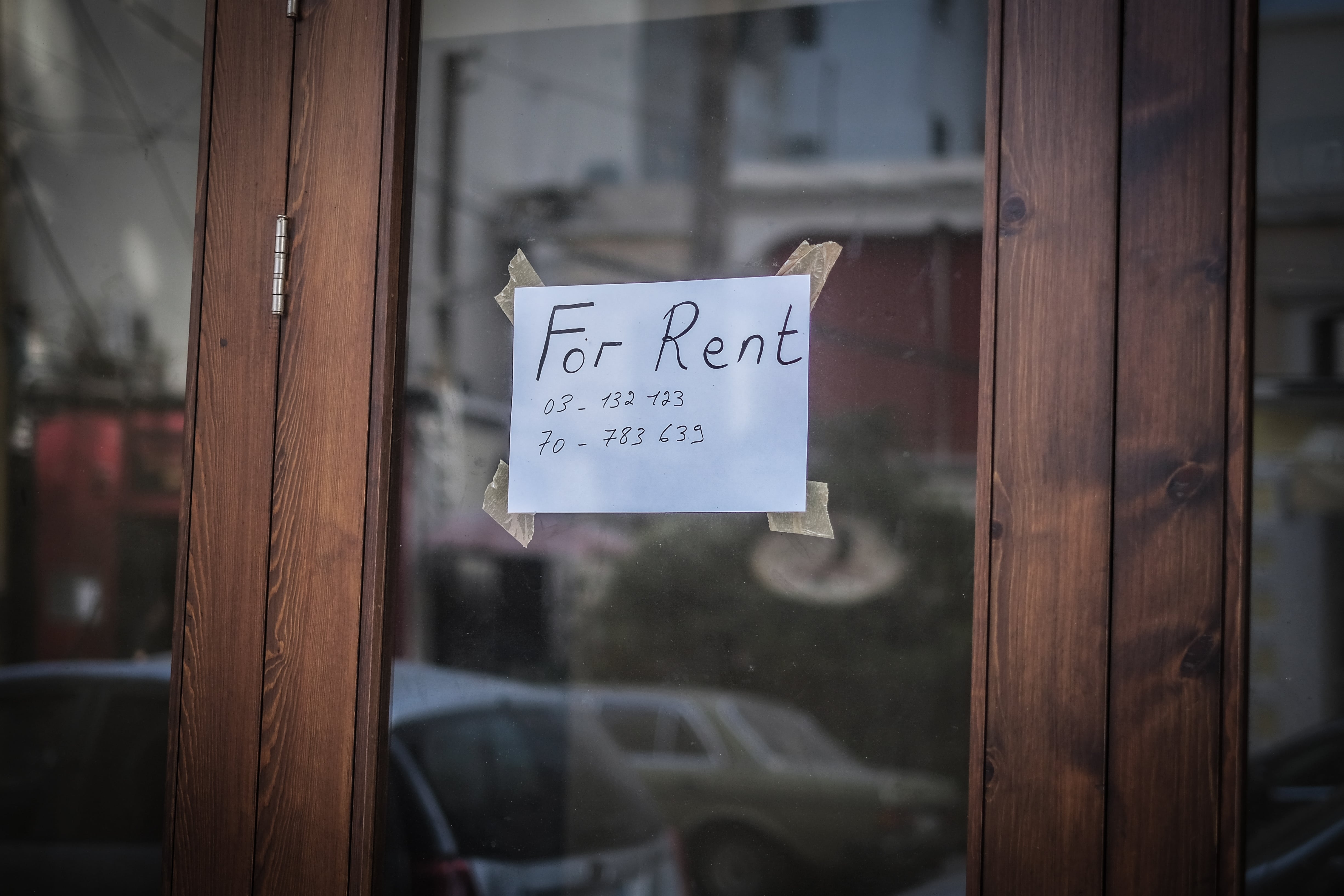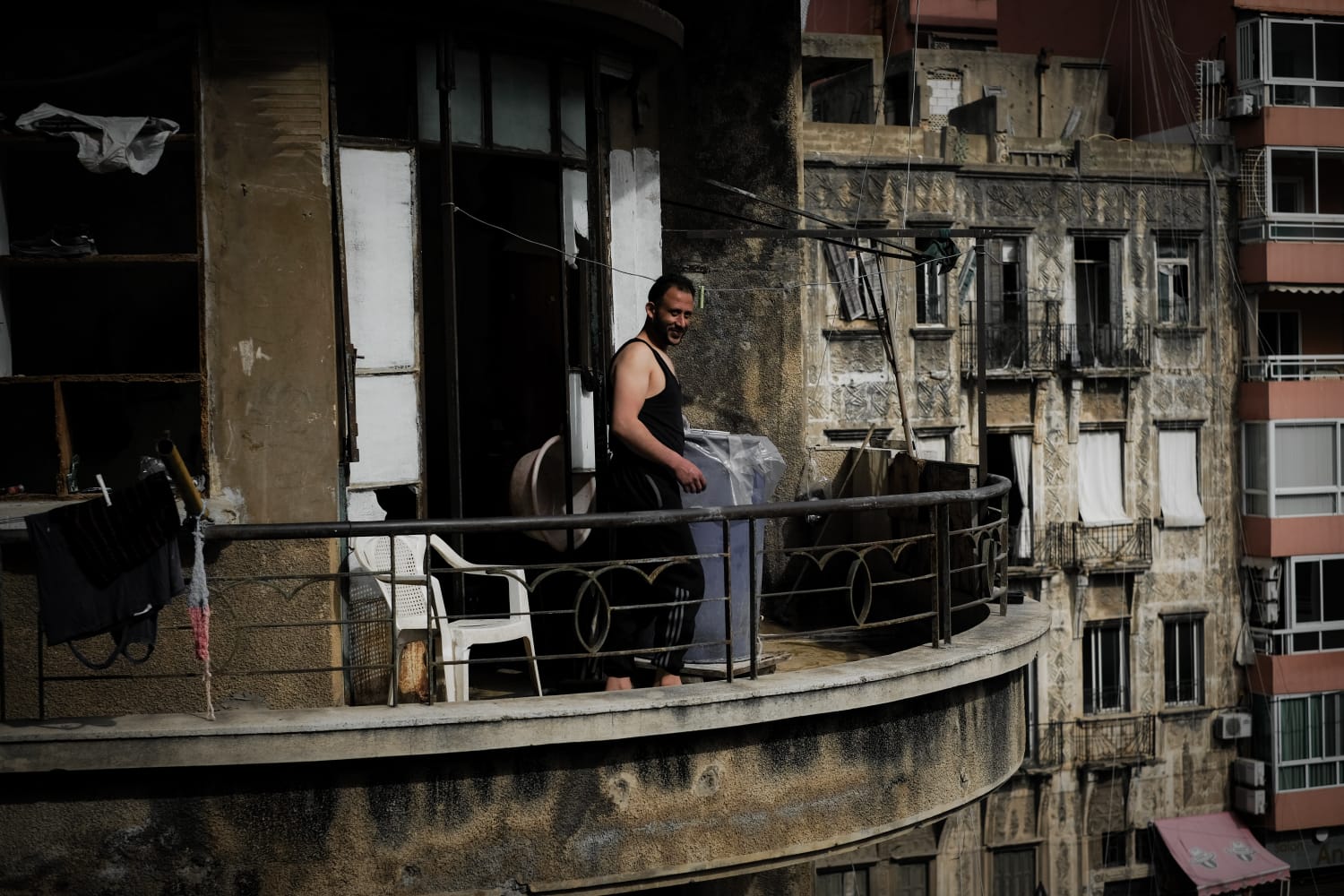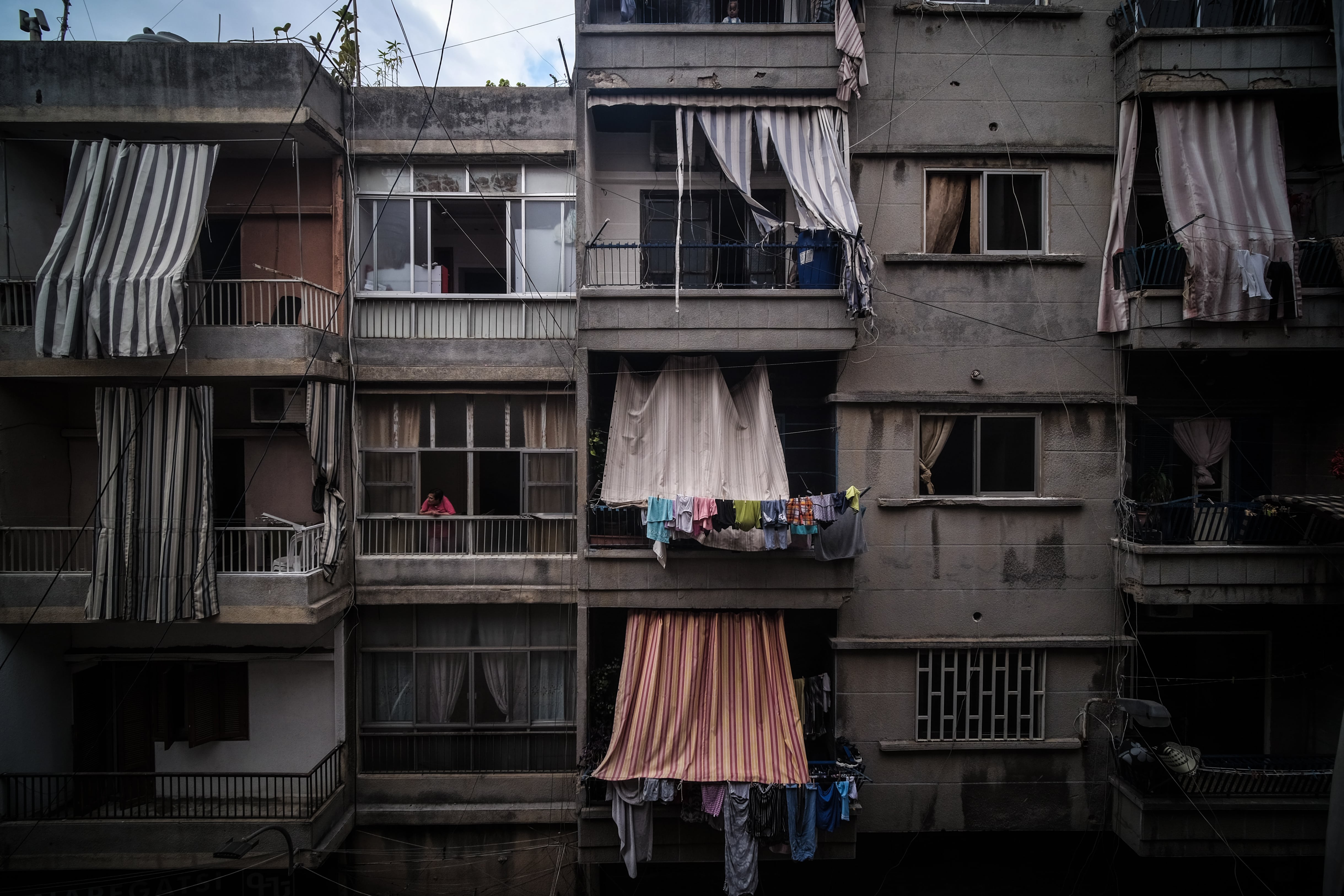
A man looks out from his balcony in Beirut. (Credit: João Sousa/L'Orient Today/File photo)
BEIRUT — As soon as Hamas began its surprise attack against Israel on Oct. 7, and talk began to swirl of Hezbollah potentially joining the fight, Rula, a tech company employee near Beirut, knew it was time to get moving.
Many of her colleagues are from areas of south Lebanon along the border and would need help finding safer housing should a bigger war erupt. By Oct. 8, she had an Excel spreadsheet ready, listing apartments and Airbnbs available for rent based on dozens of phone calls with landlords in Beirut’s eastern suburbs. Rula asked to use a pseudonym at the request of her employer.
A week later, Rula asked a coworker to follow up on the spreadsheet, and she was shocked: Based on new inquiries with the property managers and owners, the apartment rentals had shot up by “anywhere between $200-300 … to doubling in price.”
“One place we were looking at, which was $600 [before], was now $1,000,” she says. Some apartment owners had even added certain conditions, such as limits on how many people could take up residence in the property.
As the month-long threat of a broader war in Lebanon looms, residents fleeing their homes in the south and other potential flashpoint areas say landlords are taking advantage of the situation, charging them exorbitant rents for the privilege of living somewhere safe.
 A space for rent in Beirut. (Credit: João Sousa/L'Orient Today/File photo)
A space for rent in Beirut. (Credit: João Sousa/L'Orient Today/File photo)
And the risks of staying in place are only growing – this past week has seen intensified cross-border fire pitting Hezbollah and other armed groups against Israeli forces, with rockets and chemical bombs often landing in civilian areas.
The fighting has pushed more than 25,000 people to flee their homes, according to the latest data published by UN Migration.
“Because of the high demand on apartments, especially in areas considered safe, all the rent increased to exceed even the summer season prices,” says Christina Abou Rouphael, an architect and researcher at Public Works Studio.
Abou Rouphael has been spending the past month compiling research on rising rental prices in areas where displaced families have sought shelter. Her findings so far: as much as “100 to 200 percent” increases in rent in those areas.
In Rula’s words, some landlords are “looking to make a quick buck from the crisis.”
‘Shocked by rental fees’
Wissam Mehanna, 23, lives with his father and stepmother in Beirut’s southern suburbs, an area largely controlled by Hezbollah that residents fear could be in the firing line should the war escalate.
He has been looking to rent a short-term apartment in Bchamoun, a village in the mountains just a few kilometers outside Beirut, since the start of the war last month. Wissam’s father chose Bchamoun as it’s “far from the most probably targeted areas in case of war.” So far they’ve had no luck.
 A man looks out from his balcony in Beirut. (Credit: João Sousa/L'Orient Today/File photo)
A man looks out from his balcony in Beirut. (Credit: João Sousa/L'Orient Today/File photo)
Wissam’s family currently pays around $500-600 in rent per month, so they are looking for an apartment in that same price range. Wissam expressed his astonishment regarding some of the prices proposed to them: “Someone told us $900 for two to three rooms … [others proposed to my friends] $1,200 for an apartment of five to six rooms.”
“We saw [many options],” Wissam tells L’Orient Today. Though his father and a landlord managed to reach a deal, the landlord later called it off. “I think that he found someone who can pay him a higher fee,” adds Wissam.
They are still searching for a place in Bchamoun.
In addition, real estate agents say the property market itself is changing, as more people seek short-term rentals to ride out what they hope might be a short war. Rafik Yazbeck, who owns a real estate agency in Mansourieh just outside of Beirut, tells L’Orient Today the past weeks have seen increased requests for short-term apartments. His properties go for $1,000 per month for one- and three-month rentals.
Yazbeck says that, of the inquiries he received, about “10 percent of them” ended up renting one of his properties.
As apartments fill up, others, who own Airbnb properties on the outskirts of Beirut, say they’ve had an influx of requests not from the usual tourists looking for several-day stays, but rather from families scouring the market for cheap places.
“My place isn’t even equipped with the things a family might need, like a good motor or gas supply,” says Jean Hallit, who owns an apartment in Rabieh that he usually leases to tourists via Airbnb.
Hallit estimates he’s now receiving three to five requests per day from families looking to book the apartment, likely because the property is on the cheaper end of the spectrum for homes in upscale Rabieh, at $30 per night. Before, he says, he’d get just one request per week.
Exploiting the war
Layla, a 24-year-old writer, and her fiance moved from Nabatieh to a house they already owned before Oct. 7 in Aramoun, a village near Bchamoun just outside of Beirut. She requested a pseudonym to protect her family’s privacy.
Still, the couple decided to keep searching for a new place farther from Beirut, where they would feel safer. With a budget of no more than $1,200 per month, they searched in the nearby areas of Bsalim, Baabdat and Aley before finally settling on an apartment in Batroun — more than 50 kilometers north of Beirut.
 Apartments in Beirut. (Credit: João Sousa/L'Orient Today/File photo)
Apartments in Beirut. (Credit: João Sousa/L'Orient Today/File photo)
Their main reason for moving so far north: high rent prices further south, according to Layla.
“It was very expensive…someone told us $1,500 for two bedrooms, which is super crazy because it is in the middle of the mountains and it is far from Beirut… I am not gonna pay this amount here,” Layla tells L’Orient Today.
Usually, short-term and seasonal rentals like the ones currently in high demand “are more expensive than long-term rentals,” explains Abou Rouphael. But in both cases, “rentals have doubled. It’s not only related to the fact that these are seasonal rentals; it’s landlords and even brokers taking advantage of the situation.”
Mohamad Bassam, a civil engineer who lives in Beirut’s southern suburbs, was able to find a home in Aley through a friend, who offered to let him stay there for free should the situation worsen. Before securing this place, Mohamad asked about the prices of some apartments in Aley and Antelias and found out that unfurnished apartments were for $1,200 while furnished apartments were for $1,800. Meanwhile, his budget was between $300 and $1,000.
“A lot of people from the south and the southern suburbs receive money from outside because a lot of [citizens] emigrated a long time ago so most people surely have a member of their family abroad,” Mohamad says. Landlords figure “that if the situation develops, the emigrants will help their families in Lebanon so they exploited this fact.”
“This is an exploitation of the people of the south and the southern suburbs.”
These attitudes draw on existing discriminatory practices toward people from southern Lebanon, according to Abou Rouphael. Some Shiite Muslim families from the south whom her team interviewed “were shocked by sectarian practices aimed at knowing the extent of their commitment to their religious rituals. Some [real estate] offices ignore calls from families to find houses to rent in specific areas,” due to sectarian differences.
Fortunately for Fatima, who lives in Beirut’s Jnah neighborhood but has some family members living in Nabatieh, her great-grandmother and grandmother were able to secure a house in Broummana after leaving the south.
“We have an apartment in Jnah, Beirut … For more safety and especially because my great-grandmother and grandmother are old and really scared we decided to look for an apartment a bit far from Beirut,” Fatima says. Should the war escalate, she plans to join her grandmother and great-grandmother in Broummana, “as Jnah is not that safe.”
Though the $1,000 monthly rent for the apartment in Broummana was within the family’s budget, the landlord requested they pay six months' rent upfront, meaning that the family had to pay a minimum of $6,000 just to feel safe.
Still, Fatima says she’s glad simply to have found an apartment that was still available, despite the cost.
“When we decided to rent, most of the houses were already taken.”
In the end, according to Wissam, the apartment search is – theoretically – temporary. “As soon as the situation calms down,” he and his family plan to return home to Beirut’s southern suburbs.
They’ll be keeping most of his belongings in his house in the southern suburbs and only plan to take the necessities with them to the new apartment. “I prepared a bag in case of emergencies and [put] everything inside it; clothes, essentials... This way, I can directly take it and leave [the southern suburbs] in case of an emergency” Wissam says.
In other words, his family will be paying two rents at the same time once they find a short-term place to stay in the mountains.
“We probably can afford it,” he says, “but it will make things more difficult, definitely.”
